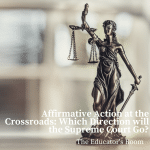Today (Monday, January 11, 2016), the Supreme Court will hear the case Friedrichs v. California Teachers Association (CTA) in what could be a pivotal moment educators, their unions, collective bargaining, and fair share fees.
In case you haven’t heard of this case, the crux of the issue is that 9 teachers in California are suing their union to not have to pay fair share fees because they disagree with the union’s political stances. Following is a discussion of the important concepts that will be addressed in this case:
What is a fair share fee, you might ask? In many districts, teachers who don’t join the union still pay for the rights that we bargain for, which includes representation at meetings, discussions with local, district, state, and national officials, negotiations, and contract ratification, among a host of other things.
In our district, we don’t have fair share fees. That bothers me. There are several teachers who receive many of the benefits of membership without paying a dime. We still go to bat for every teacher because what happens to one teacher could happen to any of us, but, more importantly, every teacher should be going to bat for every student.
The nine teachers suing the CTA are forgetting about these reasons of solidarity, common good, big picture protection and advocacy we provide for all teachers and instead are being myopic in their thoughts.
I understand that the union supports many political stances that we don’t personally support. I can definitely count those disagreements on my hands (and maybe feet), but, at the end of the day, I have come to learn that this job is – sadly – a political one. That’s because politicians make the rules we have to play by. And teach by.
I was reminded of that yesterday when Pennsylvania’s Governor Tom Wolf approached the podium at our state union’s Political Institute. He was visibly frustrated with the lack of resolve for a state budget that he proposed, providing more state money for schools and real property tax reform. Later that day, U.S. Senate candidates for Pennsylvania debated what they saw as important directions for public education. We spent the rest of the day doing the same. That’s it. We didn’t discuss anything but education issues at the political institute. Frankly, we don’t have much time, energy, or resolve to discuss much of anything else.
For that, I’m grateful that I have a union to speak for us and represent us at up the road at my district office, on N. 3rd St at our Capitol in Harrisburg, and on First & Capitol Streets and Pennsylvania Ave in Washington, D.C.
And, as public employees that are unionized, that will never change.
That is, unless the attacks on unions reverberate permanent, lasting effects. This could happen if the 9 teacher plaintiffs in Friedrichs win. The decision would peel back fair share fees, and teachers could choose to skate along – for free – with the benefits of membership. That is, until we start to lose them.
Directly and immediately, that won’t mean much for teachers who are union members or who don’t have fair share in their district. But, indirectly and long-term, the effects could be an avalanche. The teachers who don’t see the value of unions will bail. Those of us remaining behind will either need to pay more or suffer a cut back on services, both of which are lose-lose.
We believe you get what you pay for, and union leaders try to maximize what we provide to you as members. When your district comes hunting for teachers, your union is a defense to push back with grievances and labor law. When your school board members tell you that you’re going to have your pay frozen for the entirety of your next contract AND cut benefits precipitously, your union has the power to negotiate otherwise. When admins tell teachers they have to choose their job over their families by staying late, it is your union that reminds them of the hours of the working day in the contract.
Unions and their leaders know they’re not perfect. We could always do more. But if the unions are weakened, if they become constrained, limited, and have a tourniquet wrapped around them financially and fundamentally, teachers and, later, their students will suffer for it.
Both the National Education Association (NEA) and American Federation of Teachers (AFT) believe in giving their all for the common good of their teachers because they affect the common good of our students. That investment in public education and the teachers there is one of our founding democratic principles. We teachers don’t discriminate against students when they enter our classroom – we do our damndest to teach them all to the best of our ability. And, as union members and leaders, we do as much as we can the same for our fellow teachers.
I’m hopeful – today – that the Supreme Court will recognize that.





